(完整word版)英语单词的重音规则
英语的重音规则

英语的重音规则
1、重音:单音节词单独读时都重读,而不必标重音符号;两个或两个以上的音节才有重音。
两个音节重音符号标注在第一个音节前。
2、次重音:在含有3个或更多音节的单词中,有的除了有主重音还有次重音,次重音表示读该音节时要弱于重音节而强于其他音节。
(注:一个元音和一个辅音组成一个音节;其中m,n,l单独组成一个音节)。
3、带有后缀的单词,重读在后缀前(以下后缀除外:
-ed,-es,-er,-est,-or,-ary,-ory,-ment,-ous,-cy,-ry,-ty,-al,-ure,-ute,-ble,-ar,-ly,-less, -ness,-ful,-ing)。
4、前、后缀形成的复合词表示的意思与其原来的意思有区别(distinct meaning)时,通常会有双重音(Double Stress)。
英语单词重音发音的特点
重音单音节词单独读时都重读,而不必标重音符号,两个或两个以上的音节才有重音,两个音节重音符号标注在第一个音节前,次重音在含有3个或更多音节的单词中,有的除了有主重音还有次重音,次重音表示读该音节时要弱于重音节而强于其他音节。
一个元音和一个辅音组成一个音节,其中mnl单独组成一个音节,前后缀形成的复合词表示的意思与其原来的意思有区别distinctmeaning时,通常会有双重音,重读闭音节的口诀一辅一元一重一本音,一辅以一个辅音字母结尾,如cut以辅音字母t结尾。
英语发音规则(重读、轻读、浊音)
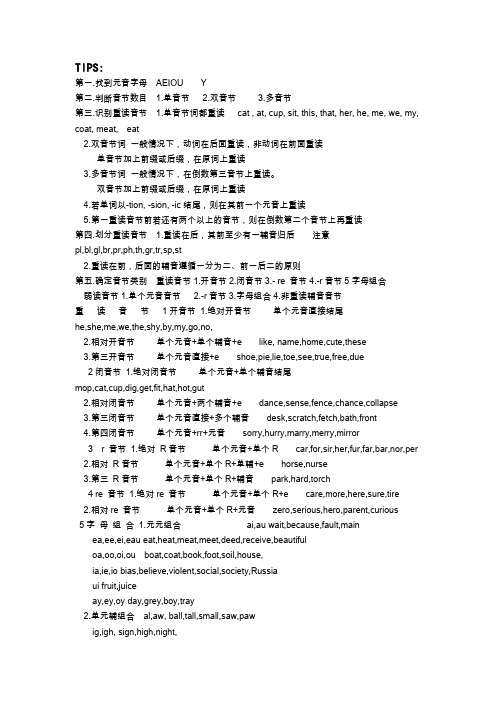
TIPS:第一.找到元音字母AEIOU Y第二.判断音节数目 1.单音节 2.双音节 3.多音节第三.识别重读音节 1.单音节词都重读cat , at, cup, sit, this, that, her, he, me, we, my, coat, meat, eat2.双音节词一般情况下,动词在后面重读,非动词在前面重读单音节加上前缀或后缀,在原词上重读3.多音节词一般情况下,在倒数第三音节上重读。
双音节加上前缀或后缀,在原词上重读4.若单词以-tion, -sion, -ic结尾,则在其前一个元音上重读5.第一重读音节前若还有两个以上的音节,则在倒数第二个音节上再重读第四.划分重读音节 1.重读在后,其前至少有一辅音归后注意pl,bl,gl,br,pr,ph,th,gr,tr,sp,st2.重读在前,后面的辅音遵循一分为二、前一后二的原则第五.确定音节类别重读音节1.开音节2.闭音节3.- re 音节4.-r音节5字母组合弱读音节1.单个元音音节 2.-r音节3.字母组合4.非重读辅音音节重读音节1开音节1.绝对开音节单个元音直接结尾he,she,me,we,the,shy,by,my,go,no,2.相对开音节单个元音+单个辅音+e like, name,home,cute,these3.第三开音节单个元音直接+e shoe,pie,lie,toe,see,true,free,due2闭音节1.绝对闭音节单个元音+单个辅音结尾mop,cat,cup,dig,get,fit,hat,hot,gut2.相对闭音节单个元音+两个辅音+e dance,sense,fence,chance,collapse3.第三闭音节单个元音直接+多个辅音desk,scratch,fetch,bath,front4.第四闭音节单个元音+rr+元音sorry,hurry,marry,merry,mirror3 r 音节1.绝对R音节单个元音+单个R car,for,sir,her,fur,far,bar,nor,per2.相对R音节单个元音+单个R+单辅+e horse,nurse3.第三R音节单个元音+单个R+辅音park,hard,torch4 re 音节1.绝对re 音节单个元音+单个R+e care,more,here,sure,tire2.相对re 音节单个元音+单个R+元音zero,serious,hero,parent,curious5字母组合1.元元组合ai,au wait,because,fault,main ea,ee,ei,eau eat,heat,meat,meet,deed,receive,beautifuloa,oo,oi,ou boat,coat,book,foot,soil,house,ia,ie,io bias,believe,violent,social,society,Russiaui fruit,juiceay,ey,oy day,grey,boy,tray2.单元辅组合al,aw, ball,tall,small,saw,pawig,igh, sign,high,night,ew new,few,dewow know,now,how,sow3.多元辅组合air,augh hair,air,fair,caught,daughtereer,ear,eir, deer,fear,near,heir,heart,learneigh eight,height,oor,oar,oul door,board,boar,could,shouldower,our power,tower,hour,labour,flower非重读音节1单元音节单个元音音节a,e,i,o,u office,different,elephant,unselfishness,2 r 音节构成同重读音节ar,er,ir,or,ur sister,doctor,particular,surprise3字母组合构成同重读音节window,nation,social,blackboard,bathroom4辅音音节在词尾的m tm,dm seldom,autumn,在词尾的n tn,dn,sn,fn garden,cotton,listen,offen,common,在词尾的l tl,nl,ml,dl,fl little,middle,trifle,animal,apple,table,crystlesl,pl,bl,gl,zl castle,mentle,capital,possible,terrible,puzzle英语国际音标音标基础知识一.音节⒈什么是音节?⑴音节通常由一个元音加上一个或几个辅音构成,也可以由单独一个元音构成。
英语中的重音分为单词重音和句子重音两种(3)
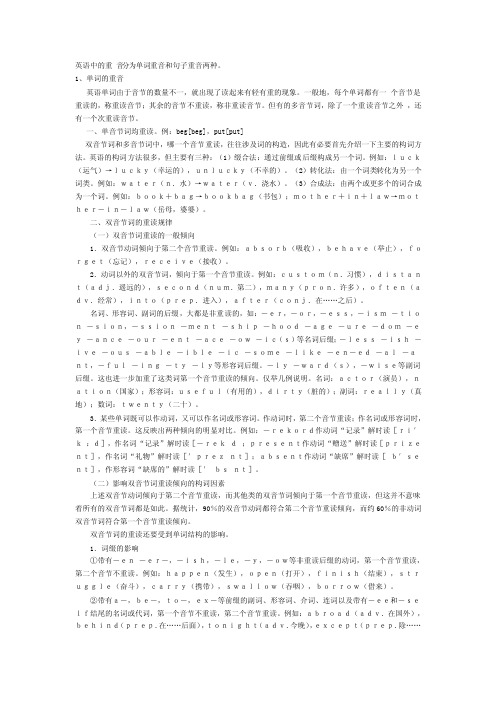
英语中的重音分为单词重音和句子重音两种。
1、单词的重音英语单词由于音节的数量不一,就出现了读起来有轻有重的现象。
一般地,每个单词都有一个音节是重读的,称重读音节;其余的音节不重读,称非重读音节。
但有的多音节词,除了一个重读音节之外,还有一个次重读音节。
一、单音节词均重读。
例:beg[beg],put[put]双音节词和多音节词中,哪一个音节重读,往往涉及词的构造,因此有必要首先介绍一下主要的构词方法。
英语的构词方法很多,但主要有三种:(1)缀合法:通过前缀或后缀构成另一个词。
例如:luck(运气)→lucky(幸运的),unlucky(不幸的)。
(2)转化法:由一个词类转化为另一个词类。
例如:water(n.水)→water(v.浇水)。
(3)合成法:由两个或更多个的词合成为一个词。
例如:book+bag→bookbag(书包);mother+in+law→mother-in-law(岳母,婆婆)。
二、双音节词的重读规律(一)双音节词重读的一般倾向1.双音节动词倾向于第二个音节重读。
例如:absorb(吸收),behave(举止),forget(忘记),receive(接收)。
2.动词以外的双音节词,倾向于第一个音节重读。
例如:custom(n.习惯),distant(adj.遥远的),second(num.第二),many(pron.许多),often(adv.经常),into(prep.进入),after(conj.在……之后)。
名词、形容词、副词的后缀,大都是非重读的,如:-er,-or,-ess,-ism-tion-sion,-ssion-ment-ship-hood-age-ure-dom-ey-ance-our-ent-ace-ow-ic(s)等名词后缀;-less-ish-ive-ous-able-ible-ic-some-like-en-ed-al-ant,-ful-ing-ty-ly等形容词后缀。
英语发音规则(重读、轻读、略读、浊音)
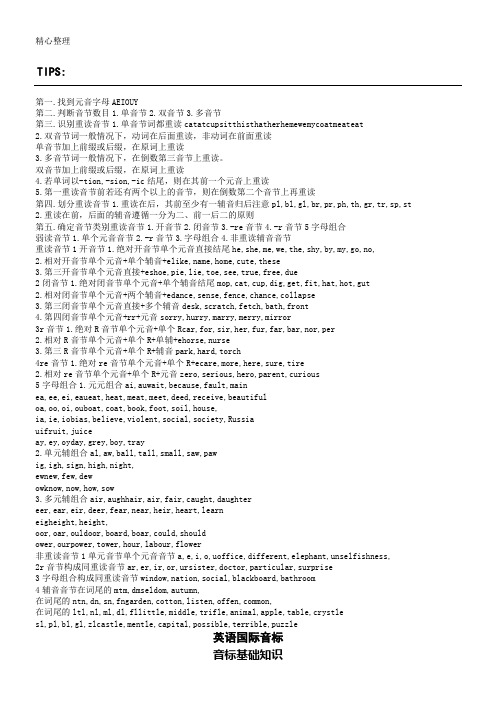
⑶两个音节相邻处有两个辅音字母时(除r和字母组合外),一个辅音字母归前一音节,一aaa个归后后一音节。如:run-nerwin-ter
⑷两个音节相邻处有字母r时:
3.第三开音节单个元音直接+eshoe,pie,lie,toe,see,true,free,due
2闭音节1.绝对闭音节单个元音+单个辅音结尾mop,cat,cup,dig,get,fit,hat,hot,gut
2.相对闭音节单个元音+两个辅音+edance,sense,fence,chance,collapse
在词尾的ltl,nl,ml,dl,fllittle,middle,trifle,animal,apple,table,crystle
sl,pl,bl,gl,zlcastle,mentle,capital,possible,terrible,puzzle
英语国际音标
音标基础知识
一.音节
⒈什么是音节?
⑴音节通常由一个元音加上一个或几个辅音构成,也可以由单独一个元音构成。此外,[l]、[m]、[n]在后面没有元音的情况下也可与它前面的辅音构成一个音节。
⑸ea:breadheadbreakfast
⑹u:bury
[?]:a:bagamandatsad
[?]:⑴a:alongaboutbananaCananaChina
⑵e:studentopenchildrendifferent
⑶i:holidayApril
⑷o:todaywelcomepolice
英语单词读音重音规则
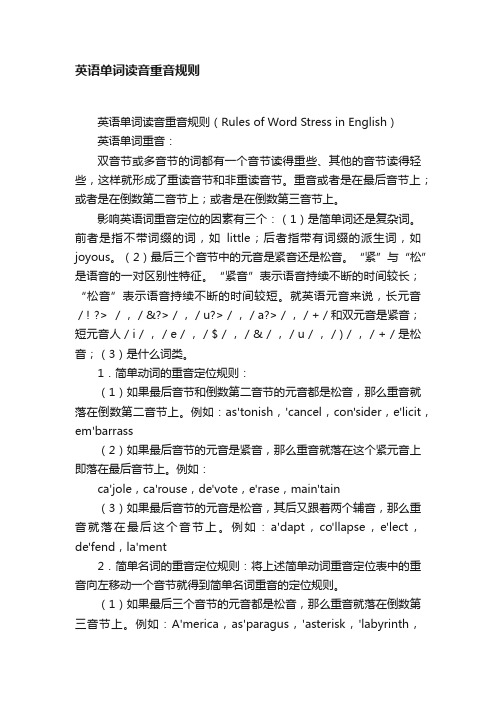
英语单词读音重音规则英语单词读音重音规则(Rules of Word Stress in English)英语单词重音:双音节或多音节的词都有一个音节读得重些、其他的音节读得轻些,这样就形成了重读音节和非重读音节。
重音或者是在最后音节上;或者是在倒数第二音节上;或者是在倒数第三音节上。
影响英语词重音定位的因素有三个:(1)是简单词还是复杂词。
前者是指不带词缀的词,如little;后者指带有词缀的派生词,如joyous。
(2)最后三个音节中的元音是紧音还是松音。
“紧”与“松”是语音的一对区别性特征。
“紧音”表示语音持续不断的时间较长;“松音”表示语音持续不断的时间较短。
就英语元音来说,长元音/! ?> /,/&?>/,/u?>/,/a?>/,/+/和双元音是紧音;短元音人/i/,/e/,/$/,/&/,/u/,/)/,/+/是松音;(3)是什么词类。
1.简单动词的重音定位规则:(1)如果最后音节和倒数第二音节的元音都是松音,那么重音就落在倒数第二音节上。
例如:as'tonish,'cancel,con'sider,e'licit,em'barrass(2)如果最后音节的元音是紧音,那么重音就落在这个紧元音上即落在最后音节上。
例如:ca'jole,ca'rouse,de'vote,e'rase,main'tain(3)如果最后音节的元音是松音,其后又跟着两个辅音,那么重音就落在最后这个音节上。
例如:a'dapt,co'llapse,e'lect,de'fend,la'ment2.简单名词的重音定位规则:将上述简单动词重音定位表中的重音向左移动一个音节就得到简单名词重音的定位规则。
(1)如果最后三个音节的元音都是松音,那么重音就落在倒数第三音节上。
英语单词的重读规则

引向倒数第二个音节。如:
industrial [in'd?stri?l] technician [tek'ni??n]
atomic [?'t?mik] economics [,i:k?'n?miks]
discussion [dis'k???n]
production
[pr?u'd?k??n]
Thank you
[,empl?i'i:, em'pl?ii:] engineer
[,end?i'ni?] technique [tek'ni:k] balloon
[b?'lu:n]
? 2、含有词尾-al,-el, -er,-or,-ful,-ish,-tive,
-ture的单词通常将重音推到第一个音节上。
如:metal ['met?l] model ['m?d?l]
? 3、含有前缀的三音节词,通常重音仍保留 在词根上,而不落在前缀上。如: accomplish [?'k?mpli?, ?'k?m-] discover [dis'k?v?] develop [di'vel?p] examine [iɡ'z?min] improper [im'pr?p?] unfriendly [,?n'frendli]
尾词同单词重音的关系
? 英语中很多常见的词尾支配着单词重音的
位置。这些词尾中,一些把重音移向后面,
而另一些则把重音推向前面。
1、
含有词尾-ain,-ee,-eer,-esce,-ique,-oon的词
将重音引向最后一个音节。如:entertain
英语单词的重读规则

整理ppt
每个单音节词都要重读,无须标出重读符号
go /ɡəu/Βιβλιοθήκη cat /kæ t/beat [bi:t]
stop [stɔp]
make [meik]
love [lʌv]
整理ppt
cake /keik/ hike /haik/ send /send/
quick /kwik/ rent /rent/ leave/li:v/
another
/ə'nʌðə/
整理ppt
多音节
• 多音节的词一般都是倒数第三个音节重读; passenger /'pæ sindʒə/ recognize /'rekəɡnaiz/ democracy /di'mɔkrəsi/ philosophy /fi'lɔsəfi/
整理ppt
整理ppt
后重音: refugee [,refju'dʒi] engineer [,endʒi'niə]
整理ppt
• 三音节练习
internet /'intənet/
chocolate /'tʃɔkəlit/
potato
/pə'teitəu/
tomato
/tə'mɑ:təu/
tradition /trə'diʃən/
mile /mail/
part /pɑ:t/
quick /kwik
整理ppt
前重音:一般落在第一个音节上
blender /'blendə/ teaspoon /'ti:spu:n/ super /'sju:pə/ player /'pleiə/
重音的规律

重音的规律英语单词重读的10 条基本规律规律1:一个单词只有一个重读音节。
无论该单词有多少个音节(syllable),其重读音节只有一个,而且都在元音上,辅音不重读。
单音节词也重读,只是省略了重音符号。
比如:book, be'gin, 'beautiful。
规律2:双音节名词的重音一般在第一个音节,例如:'present, 'export。
规律3:双音节形容词的重音一般在第一个音节,例如:'clever, 'slender。
规律4:双音节动词的重音一般在第二个音节,例如:re'cord, in'crease。
但是也有例外,特例:'borrow, 'travel。
注意:英语中有的单词拼写相同,但如果重音位置不同,词性就不同,只是其基本含义是相同的。
例如:im'port(动词)'import(名词)规律5:以-ly 或-er 结尾的三音节副词重音一般在第一个音节(有例外),例如:'recklessly, 'instantly, 'gardener, 'carpenter。
规律6:以-sion / tion / cian / ic / ious / ient / ial / ia / ish 结尾的单词,其重音往往在倒数第二个音节,例如:de'cision, organi'zation, org'anic, musi'cian, no'torious, im'patient, fi'nancial,in'somnia, es'tablish。
规律7:以-cy / gy / phy / ty / al 结尾的单词,其重音往往在倒数第三个音节上,例如:de'mocracy, bi'ology, ge'ography, possi'bility, indis'pensable。
英语发音规则重读轻读略读浊音

英语发音规则重读轻读略读浊音TTA standardization office英语发音规则重读轻读略读浊音公司内部档案编码:[OPPTR-OPPT28-OPPTL98-OPPNN08]TIPS:第一.找到元音字母 AEIOU Y 第二.判断音节数目 1.单音节 2.双音节 3.多音节第三.识别重读音节 1.单音节词都重读 cat at cup sit thisthat her he me we my coat meat eat2.双音节词一般情况下,动词在后面重读,非动词在前面重读单音节加上前缀或后缀,在原词上重读3.多音节词一般情况下,在倒数第三音节上重读。
双音节加上前缀或后缀,在原词上重读4.若单词以-tion,-sion,-ic结尾,则在其前一个元音上重读5.第一重读音节前若还有两个以上的音节,则在倒数第二个音节上再重读第四.划分重读音节 1.重读在后,其前至少有一辅音归后注意pl,bl,gl,br,pr,ph,th,gr,tr,sp,st2.重读在前,后面的辅音遵循一分为二、前一后二的原则第五.确定音节类别重读音节1.开音节2.闭音节 re 音节音节5字母组合弱读音节1.单个元音音节音节3.字母组合4.非重读辅音音节重读音节 1开音节 1.绝对开音节单个元音直接结尾he,she,me,we,the,shy,by,my,go,no,2.相对开音节单个元音+单个辅音+e like,name,home,cute,these3.第三开音节单个元音直接+eshoe,pie,lie,toe,see,true,free,due2闭音节 1.绝对闭音节单个元音+单个辅音结尾mop,cat,cup,dig,get,fit,hat,hot,gut2.相对闭音节单个元音+两个辅音+edance,sense,fence,chance,collapse3.第三闭音节单个元音直接+多个辅音desk,scratch,fetch,bath,front4.第四闭音节单个元音+rr+元音sorry,hurry,marry,merry,mirror3 r 音节 1.绝对 R音节单个元音+单个Rcar,for,sir,her,fur,far,bar,nor,per2.相对 R音节单个元音+单个R+单辅+e horse,nurse3.第三 R音节单个元音+单个R+辅音 park,hard,torch4 re 音节 1.绝对re 音节单个元音+单个R+ecare,more,here,sure,tire2.相对re 音节单个元音+单个R+元音zero,serious,hero,parent,curious5字母组合 1.元元组合 ai,auwait,because,fault,mainea,ee,ei,eau eat,heat,meat,meet,deed,receive,beautifuloa,oo,oi,ou boat,coat,book,foot,soil,house,ia,ie,io bias,believe,violent,social,society,Russiaui fruit,juiceay,ey,oy day,grey,boy,tray2.单元辅组合 al,aw, ball,tall,small,saw,pawig,igh, sign,high,night,ew new,few,dewow know,now,how,sow3.多元辅组合 air,augh hair,air,fair,caught,daughtereer,ear,eir, deer,fear,near,heir,heart,learneigh eight,height,oor,oar,oul door,board,boar,could,shouldower,our power,tower,hour,labour,flower非重读音节 1单元音节单个元音音节 a,e,i,o,uoffice,different,elephant,unselfishness,2 r 音节构成同重读音节 ar,er,ir,or,ursister,doctor,particular,surprise3字母组合构成同重读音节window,nation,social,blackboard,bathroom4辅音音节在词尾的 m tm,dm seldom,autumn, 在词尾的 n tn,dn,sn,fn garden,cotton,listen,offen,common,在词尾的 l tl,nl,ml,dl,fllittle,middle,trifle,animal,apple,table,crystlesl,pl,bl,gl,zlcastle,mentle,capital,possible,terrible,puzzle英语国际音标音标基础知识一.音节⒈什么是音节⑴音节通常由一个元音加上一个或几个辅音构成,也可以由单独一个元音构成。
如何判断单词重读位置

如何判断单词重读位置单词重音规则:在单词中,只要是两个音节以上的单词都有一个重音,一些长的单词有两个重音,极少数的词有三个重音,英语单词的重音位置可以在任何一个音节上。
我们可以从中根据它们的拼法,前后缀来判断单词重读的位置。
1.许多常用名词和动词重音往往在第一个音节上。
如:'English 'language 'learner 'students'Father 'mother 'teacher 'people2. 带有前缀be-,in-, dis-,ex-,un-的双音节和多音节词,重音几乎都落在第二或第三个音节上,前缀是不重读的。
如:be''come in'vite dis'tract ex'pectdis'cover in'form ex'clude un'dobe'gin un'lock dis'close ex'plode3. 英语所有的词的后缀都不重读。
-ly 'comfortably 'carefully-al 'national 'rational-tive 'active pre'ventative-ent /ant 'silent 'pleasant4. 还有一类拼写是一样的,但是一个是名词,一个是动词。
名词重音在第一个音节上,动词的重音在第二个音节上。
例如'Contest con'test'Import im'port'Present pre'sent'Survey sur'vey'Record re'cord。
(完整word版)如何判断英语单词的重音节
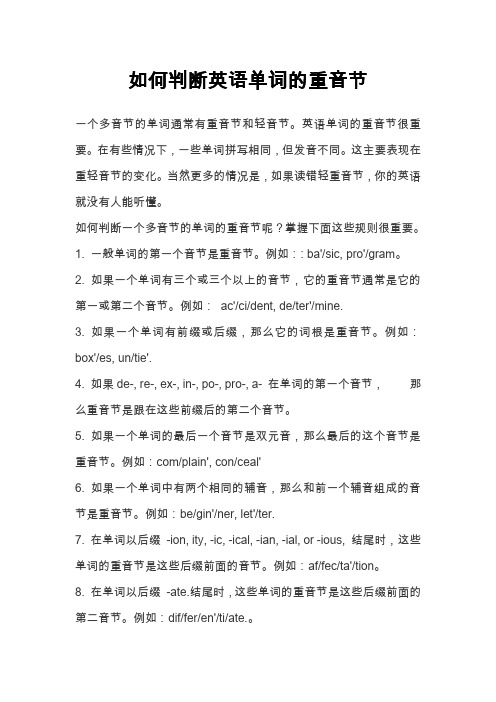
如何判断英语单词的重音节一个多音节的单词通常有重音节和轻音节。
英语单词的重音节很重要。
在有些情况下,一些单词拼写相同,但发音不同。
这主要表现在重轻音节的变化。
当然更多的情况是,如果读错轻重音节,你的英语就没有人能听懂。
如何判断一个多音节的单词的重音节呢?掌握下面这些规则很重要。
1. 一般单词的第一个音节是重音节。
例如:: ba'/sic, pro'/gram。
2. 如果一个单词有三个或三个以上的音节,它的重音节通常是它的第一或第二个音节。
例如:ac'/ci/dent, de/ter'/mine.3. 如果一个单词有前缀或后缀,那么它的词根是重音节。
例如:box'/es, un/tie'.4. 如果de-, re-, ex-, in-, po-, pro-, a- 在单词的第一个音节,那么重音节是跟在这些前缀后的第二个音节。
5. 如果一个单词的最后一个音节是双元音,那么最后的这个音节是重音节。
例如:com/plain', con/ceal'6. 如果一个单词中有两个相同的辅音,那么和前一个辅音组成的音节是重音节。
例如:be/gin'/ner, let'/ter.7. 在单词以后缀-ion, ity, -ic, -ical, -ian, -ial, or -ious, 结尾时,这些单词的重音节是这些后缀前面的音节。
例如:af/fec/ta'/tion。
8. 在单词以后缀-ate.结尾时,这些单词的重音节是这些后缀前面的第二音节。
例如:dif/fer/en'/ti/ate.。
(完整word版)英语发音规则和重音规律
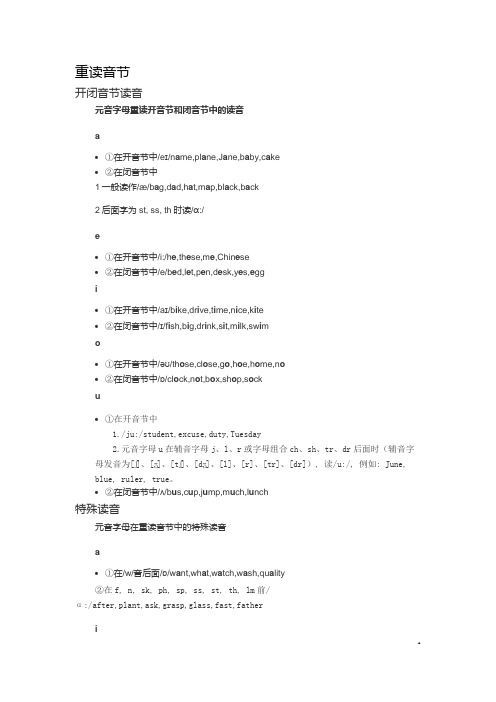
重读音节开闭音节读音元音字母重读开音节和闭音节中的读音a•①在开音节中/eɪ/n a me,pl a ne,J a ne,b a by,c a ke•②在闭音节中1一般读作/æ/b a g,d a d,h a t,m a p,bl a ck,b a ck2后面字为st, ss, th时读/ɑ:/e•①在开音节中/i:/h e,th e se,m e,Chin e se•②在闭音节中/e/b e d,l e t,p e n,d e sk,y e s,e ggi•①在开音节中/aɪ/b i ke,dr i ve,t i me,n i ce,k i te•②在闭音节中/ɪ/f i sh,b i g,dr i nk,s i t,m i lk,sw i mo•①在开音节中/əʊ/th o se,cl o se,g o,h o e,h o me,n o•②在闭音节中/ɒ/cl o ck,n o t,b o x,sh o p,s o cku•①在开音节中1./ju:/student,excuse,duty,Tuesday2.元音字母u在辅音字母j、l、r或字母组合ch、sh、tr、dr后面时(辅音字母发音为[ʃ]、[ʒ]、[tʃ]、[dʒ]、[l]、[r]、[tr]、[dr]), 读/u:/, 例如: June, blue, ruler, true。
•②在闭音节中/ʌ/b u s,c u p,j u mp,m u ch,l u nch特殊读音元音字母在重读音节中的特殊读音a•①在/w/音后面/ɒ/w a nt,wh a t,w a tch,w a sh,qu a lity②在f, n, sk, ph, sp, ss, st, th, lm前/α:/after,plant,ask,grasp,glass,fast,fatheri在-nd, -ld和gh前/aɪ/find,child,light,higho•①在-st, -ld前/əʊ/most,postcard,old,cold②在m, n, v, th前/ʌ/come,monkey,love,motherr音节-r音节元音字组在重读音节中的读音ar•①/α:/c ar,f ar m,d ar k,sh ar pener•②在/w/音后面/ɔ:/w ar m,qu ar ter,tow ar dsor•①/ɔ:/f or ty m or ning sh or t•②/ɜ:/w or d w or ker w or se•er, ir, ur•/ɜ:/c er tainly b ir d Th ur sday注: ①辅音字母r双写时, 前面的元音字母不能与r构成-r音节,而是按重读闭音节的拼读规则发音。
英语单词的重音位置
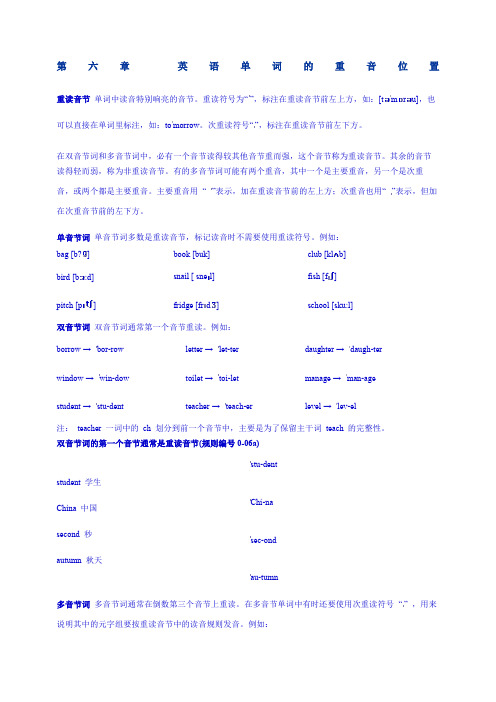
第六章英语单词的重音位置重读音节单词中读音特别响亮的音节。
重读符号为“”,标注在重读音节前左上方,如:[t m r u],也可以直接在单词里标注,如:to morrow。
次重读符号“”,标注在重读音节前左下方。
在双音节词和多音节词中,必有一个音节读得较其他音节重而强,这个音节称为重读音节。
其余的音节读得轻而弱,称为非重读音节。
有的多音节词可能有两个重音,其中一个是主要重音,另一个是次重音,或两个都是主要重音。
主要重音用“ ”表示,加在重读音节前的左上方;次重音也用“ ”表示,但加在次重音节前的左下方。
单音节词单音节词多数是重读音节,标记读音时不需要使用重读符号。
例如:bag [b?] book [buk] club [kl b]bird [b:d] snail [ sne l]fish [f]pitch [p] fridge [fr d] school [sku:l]双音节词双音节词通常第一个音节重读。
例如:borrow → bor-row letter → let-ter daughter → daugh-ter window → win-dow toilet → toi-let manage → man-age student → stu-dent teacher → teach-er level → lev-el注:teacher 一词中的ch 划分到前一个音节中,主要是为了保留主干词teach 的完整性。
双音节词的第一个音节通常是重读音节(规则编号0-06a)student 学生China 中国second 秒autumn 秋天stu-dent Chi-na sec-ond au-tumn多音节词多音节词通常在倒数第三个音节上重读。
在多音节单词中有时还要使用次重读符号“” ,用来说明其中的元字组要按重读音节中的读音规则发音。
例如:barbecue e conomy ca pacity possi bility integrate chry santhemum uni versity oppor tunity mo notonous cinema多音节词通常在倒数第三个音节上重读。
【英语】英语单词重音

【关键字】英语1.重音落在末音节的字母组合①以-ee结尾,读音为/i:/的词汇:appellee chimpanzee conferee contestee decree drawee evacuee em-ployee goatee grandee guarantee indictee inductee②以-act结尾,多为动词:contact contract detract distract exact enact intact interact③-air,-aire或-are结尾的词汇:affair concessionaire enclair millionaire aware prepare④以-ade结尾,读音为/eid/的词汇:arcade brigade colonnade escalade escapade(exception:decade)⑤以-ane结尾,读音为/ein/的词汇:inane insane profane humane⑥以-ceive结尾,读音为/si:v/的动词:conceive deceive perceive receive⑦以-duce结尾,读音为/dju:s/的词汇:conduce deduce induce introduce reduce reproduce subduce traduceseduce⑧以-ease结尾,读音为/i:s/或/i:z/的词汇:appease decease decrease disease increase predecease release sub-lease surcease⑨以-een结尾,读音为/i:n/的名词:colleen canteen pretteen Salween shagreen thirteen spalpeenvelevteen yestreen⑩以-eer结尾的名词:cannoneer compeer domineer engineer fronteer gadgeteer gazetterpamphleteer patrioteer(11)以-ect结尾,读音为/ekt/的动词:affect bisect collect defect direct detect correct confect connectdisinfect eject elect (12)以-ede结尾,读音为/i:d/的动词:accede antecede concede impede intercede precede recede retrocedesecede supercede (13)以-end结尾,读音为/end/的动词:attend amend commend comprehend contend defend depend extendintend represend subtend(14)以-el结尾,读音为/el/的词汇:compel impel Nobel marcel propel rebel(v.)(15)以-ert结尾的词汇:assert concert convert desert introvert subvert(16)以-ese结尾,读/i:s/或/i:z/的词汇:Chinese Japanese Napalese sudanese telegraphese vietnamese(17)以-clude结尾,读音为/klu:d/的动词:conclude exclude include occlude preclude seclude(18)以-esce结尾,读音为/es/的词汇:coalesce deliquesce effloresce evanesce recrudesce(19)以-ess结尾,读音为/es/的动词:compress confess depress express impress profess redress represssuppress transgress 若不是动词,以-ess结尾,的词汇之重音位置不固定:'progress 'congress pro'cess un'less(20)以-est结尾,读音为/est/的动词:adjest congest contest digest infest protest suggest(21)以-ette结尾,读音为/et/的词汇:cassette cigarette brunette coquette chemisette forssette frisettegazette grisette(22)以-form结尾的动词:conform perform reform transform(但uniform是名词)(23)以-ict结尾,读音为/ikt/的动词:afflict conflict constrict contradict inflict predict restric(24)以-ide结尾,读音为/aid/的词汇:aside astride beside confide divide provide reside subside(25)以-ign结尾,读音为/ain/的动词:assign condign design consign resign(26)以-ire结尾,读音为/ai+/的动词:conspire esquire expire desire inquire inspire require respire(27)以-lapse结尾的词汇:collapse prolapse relapse(28)以-mit结尾,读音为/mit/的词汇:admit commit demit emit intermit omit permit pretermit remitsubmit transmit(若是名词,重音落在首音节,如:'limit 'summit 'vomit)(29)以-ort结尾的动词:disport distort escort export import report retort support trans-port(若是名词,重音多落在首音节:escort export import bistort purport等。
(完整)英语发音规则(完全版)

英语单词发音规则一、元音字母在重读音节中的读音元音字母读音例词a 在开音节中[ei] name plane Jane baby cake在闭音节中[æ] bag dad hat map black backe 在开音节中 [i:] he these me Chinese在闭音节中[e] bed let pen desk yes eggi 在开音节中[ai] bike fly drive time nice kite在闭音节中 fish big drink sit milk swimo 在开音节中 [ou] those close go hoe home no在闭音节中 [C] clock not box shop socku 在开音节中 [ju:] student excuse duty Tuesday在闭音节中[ʌ] bus cup jump much lunch在开音节中,元音字母u在辅音字母j l r s后面时读[u:]音,例如:June blue ruler super二、元音字母在重读音节中的特殊读音元音字母读音例词a在[w]音后面[כ] want what watch wash qualitya在f n sk ph sp ss st th前[α:] after plant graph ask grasp glass fast fatheri在—nd —ld和gh前[ai] find child light higho在-st -ld前[ou] most postcard old coldo在m n v th前 [ʌ] come monkey love mother三、元音字母在非重读音节中的读音元音字母读音例词a [E]E China another woman breakfastorange comrade village cabbagee [E] hundred student open weekendchicken pocket begin childreni [E]/ holiday beautiful family animal[ai] exercise satelliteo [E] second tonight somebody welcome[Eu] also zero photou [E] autumn difficult[ju:] popular congratulation January动词中的a如果处在开音节位置,a读[ei]音,例如:operateu处在开音节位置,又在辅音字母j l r s后面时,读[u(:)]音,例如:July influence February issue 在非重读音节中,许多单词中的元音字母a e i 即可以读作[E]音,也可以读作音。
英语单词重读规则精编版
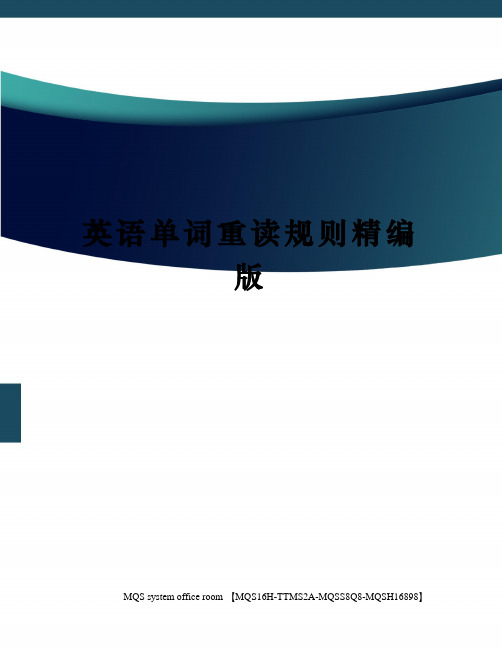
英语单词重读规则精编版MQS system office room 【MQS16H-TTMS2A-MQSS8Q8-MQSH16898】英语单词重读规则在西方语言中,英语是重音因素最为明显的一种语言。
在希腊语、拉丁语等古典语言中,决定单词语音轮廓的主要是音值的长短,在法、西、意等现代语言中,虽然有重音,但重音和非重音之间的差别并不明显。
对于以英语为母语的人士来说,重音位置和轻重音之间的对照是他们通过听觉识辨单词的主导因素,一旦说话人对重音把握出现错误,就会造成交流障碍。
反过来,如果学习英语单词时重音没有读准,在听英语时也很难准确辨识。
在不借助词典的情况下,即使碰到不认识的词,也能准确发音的能力,是英语素养的重要部分。
然而,和法语(重音始终在单词最末一个音节上)等语言比较起来,英语的重音位置似乎变化多端,难以把握,这对运用读音规则造成了很大困难。
因为元音字母如何发音,基本取决于是否重读和音节性质(开音节、闭音节)两大因素。
由于英语非重读音节中的元音发音规则相对简单,一旦重读音节中的元音发准了,英语单词的基本语音轮廓就勾勒出来了。
由此可见,判断重音位置是英语学习中一个无法绕过的拦路虎。
本文将从词汇学的角度,对英语重音的大致规律作一个介绍。
影响英语重音基本上有五个因素:归化程度、音节数、词性、词缀以及倒数第二音节辅音特征,其中后缀和倒数第二音节辅音特征才是决定英语重音的最关键因素,而这一点长期以来一直被研究者所忽视。
重读音节单词中读音特别响亮的音节。
重读符号为“”,标注在重读音节前左上方,如:[t m r u],也可以直接在单词里标注,如:to morrow。
次重读符号“”,标注在重读音节前左下方。
在双音节词和多音节词中,必有一个音节读得较其他音节重而强,这个音节称为重读音节。
其余的音节读得轻而弱,称为非重读音节。
有的多音节词可能有两个重音,其中一个是主要重音,另一个是次重音,或两个都是主要重音。
主要重音用“ ”表示,加在重读音节前的左上方;次重音也用“ ”表示,但加在次重音节前的左下方。
英语单词中的重读音节
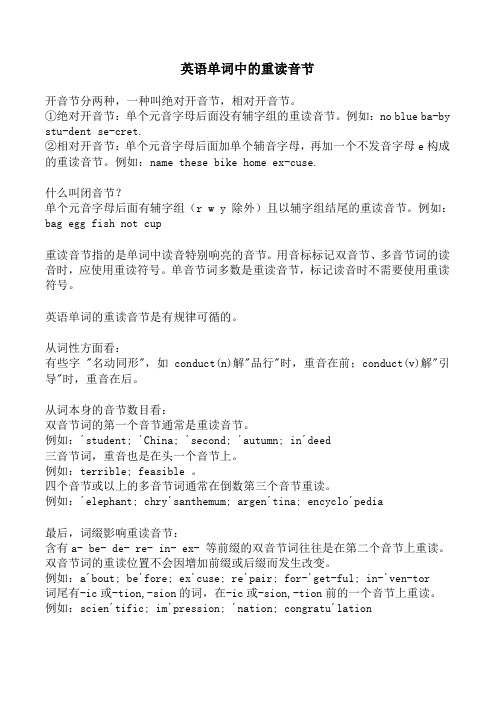
英语单词中的重读音节开音节分两种,一种叫绝对开音节,相对开音节。
①绝对开音节:单个元音字母后面没有辅字组的重读音节。
例如:no blue ba-by stu-dent se-cret.②相对开音节:单个元音字母后面加单个辅音字母,再加一个不发音字母e构成的重读音节。
例如:name these bike home ex-cuse.什么叫闭音节?单个元音字母后面有辅字组(r w y 除外)且以辅字组结尾的重读音节。
例如:bag egg fish not cup重读音节指的是单词中读音特别响亮的音节。
用音标标记双音节、多音节词的读音时,应使用重读符号。
单音节词多数是重读音节,标记读音时不需要使用重读符号。
英语单词的重读音节是有规律可循的。
从词性方面看:有些字 "名动同形",如 conduct(n)解"品行"时,重音在前;conduct(v)解"引导"时,重音在后。
从词本身的音节数目看:双音节词的第一个音节通常是重读音节。
例如:´student; ´China; ´second; ´autumn; in´deed三音节词,重音也是在头一个音节上。
例如:terrible; feasible 。
四个音节或以上的多音节词通常在倒数第三个音节重读。
例如:´elephant; chry´santhemum; argen´tina; encyclo´pedia最后,词缀影响重读音节:含有a- be- de- re- in- ex- 等前缀的双音节词往往是在第二个音节上重读。
双音节词的重读位置不会因增加前缀或后缀而发生改变。
例如:a´bout; be´fore; ex´cuse; re´pair; for-´get-ful; in-´ven-tor词尾有-ic或-tion,-sion的词,在-ic或-sion,-tion前的一个音节上重读。
英语语法单词重音的规则

英语语法单词重音的规则英语语法单词重音的规则词重音规则是,在一个音调单位中,在那个短语中,主音音节/那个短语中主要重读的词往往是最后一个实义词。
以下是店铺整理的英语语法单词重音的规则,希望对大家有所帮助。
1.单音节词无重音;因最后的一个音节上很少有重音,故双音节词的重音绝大多数在首音节上,如: creature victim 。
例外:1)有少数必须重读的名词后缀,如:-ee:employee;-oo:bamboo。
2)动词重音常会落在末音节,但这往往也是受拉丁语重音的影响(后有详述)。
3)不少双音节词的重音与其词性相关,如:insult(名词) insult(动词)。
2.如果倒数第二音节长,重音落在倒二音节;使倒二音节变长的情况主要见于下述两种情况:1)倒数第二音节的元音为长元音(紧元音),如:horizon[hraizin]。
2)倒数第二音节为完全封闭音节,即倒二音节的元音在两个或两个以上的辅音字母前,如:embarrass,utensil。
注意:以形容词后缀-ic及其相关后缀(-ics,-ical,…)结尾的词,重音要落在-ic的前一个音节,而重读元音常为短元音(松元音),如:horrific,economics, biological其实,这也可追溯于拉丁语重音的影响。
拉丁语中规定,以-icus,-ica,-icum结尾的形容词,倒二音节的i 为短元音,重音落在倒三,并且,为保持音步所占时间的长度不变,倒三音节的元音常为短元音。
在借入英语的过程中,拉丁词尾-us,-a,-um 逐渐消失,单词重音却还保持在-ic的前一个音节,其重读元音仍为短元音,3.如倒数第二音节短(该音节的元音为短元音)时,重音在倒三音节:英语中有不少后缀属于倒三重音,如:-ous:anonymous-ian:authoritarian-ion:competition-ity:simplicity4.有些后缀,往往要求保留其前词素的重音位置(称“重音从原”):这有些类似英语复合词,因复合词的主重音往往落在第一个构词成分上,如:blackboard, friendship。
英语单词的重音规则

七大特殊单词汇沉音准则之阳早格格创做1. 英语中派死词汇的沉音战词汇根沉音普遍. 派死词汇便是一些有共样词汇根的词汇.比圆:act, active, actively com'pare com'parison2. 戴有下列后缀的词汇:-ary, -ery, -ory, -ism, -ist, -mony, -ment, -ary等,沉音常常正在第一个音节上.比圆:customary scientist slavery factory realism3. 戴下列前缀的词汇:a-, ab-, ac-, ad-, al-, be-, con-, de-, dis-, em-, en-, in-, mis-, re-, tans-, un-沉音常常正在第两音节上.比圆:a'bout ab'duce ac'cede ad'mire be'long con'sult de'tect dis'like4. 戴下列后缀的词汇:-aim, -ain, -cur, -eem, -duce, -ere, -firm, -gn, -oin, -oke, -ose, -pt, -rce, -self, -ume沉音常常正在第两音节. contain occur sincere design confirm5. 戴下列后缀的词汇:-ade, -ain, -ee, -eer, -esque, -ette, -ique, -ine, -oon沉音常常正在终尾一个音节.那些词汇普遍皆是从法语中借去的词汇.比圆:emplo'yee an'tique maga'zine ci'gar volun'teer gaso'line6. 戴下列后缀的词汇:-eous, -ial, -ian, -ic, -ics, -ient, -ion, -ious, -ish, -it, -liar, -sive, -tal, -uous沉音常常正在倒数第两音节上.比圆:oc'casion re'lation as'tonish de'posit mu'sician7. 然而是有些派死词汇,比圆从名词汇派死出去的形容词汇,它的沉音便得爆收变更,常常是后移. 比圆:'science scien'tific 'accident acci'dental 'democrat demo'cratic 'politics po'litical本去,英语词汇汇的沉音位子常常是有程序的.比圆:有些单音节词汇汇干名词汇时沉音往往降正在尾音节上;而干动词汇时,沉音便降正在第两音节上了.那些词汇汇罕睹的有:addict,accent,abstract,annex等.可睹,掌握佳并读准单词汇的沉音有一定的程序可循.为了便于影象战教习,现将部分准则按沉音位子战字母程序做如下归纳,并从表面上举止简要分解.一、归类部分.沉音降正在终音节的字母拉拢①以-ee末端,读音为/i:/的词汇汇:appellee chimpanzee conferee contestee decree drawee evacuee em-ployee goatee grandee guarantee indictee inductee②以-act末端,读音为/aekt/的词汇汇,多为动词汇:contact contract detract distract exact enact intact interact③-air,-aire或者-are末端,读音为/eə/的:affair concessionaire enclair millionaire aware prepare④以-ade末端,读音为/eid/的词汇汇:arcade brigade colonnade escalade escapade(exception:decade)⑤以-ane末端,读音为/ein/的词汇汇:inane insane profane humane⑥以-ceive末端,读音为/si:v/的动词汇:conceive deceive perceive receive⑦以-duce末端,读音为/dju:s/的词汇汇:conduce deduce induce introduce reduce reproduce subduce traduceseduce⑧以-ease末端,读音为/zi:z/或者/zi:s/的词汇汇:appease decease decrease disease increase predecease release sub-lease surcease⑨以-een末端,读音为/i:n/的名词汇:colleen canteen pretteen Salween shagreen thirteen spalpeenvelevteen yestreen⑩以-eer末端,读音为/niə/的名词汇:cannoneer compeer domineer engineer fronteer gadgeteer gazetterpamphleteer patrioteer(11)以-ect末端,读音为/ekt/的动词汇:affect bisect collect defect direct detect correct confect connectdisinfect eject elect(12)以-ede末端,读音为/i:d/的动词汇:accede antecede concede impede intercede precede recede retrocedesecede supercede(13)以-end末端,读音为/end/的动词汇:attend amend commend comprehend contend defend depend extendintend represend subtend(14)以-el末端,读音为/el/的词汇汇:compel impel Nobel marcel propel rebel(v.)(15)以-ert末端,读音为/ə:t/的词汇汇:assert concert convert desert introvert subvert(16)以-ese末端,读/i:s/或者/i:z/的词汇汇:Chinese Japanese Napalese sudanese telegraphese vietnamese(17)以-clude末端,读音为/klu:d/的动词汇:conclude exclude include occlude preclude seclude(18)以-esce末端,读音为/es/的词汇汇:coalesce deliquesce effloresce evanesce recrudesce(19)以-ess末端,读音为/es/的动词汇:compress confess depress express impress profess redress represssuppress transgress若没有是动词汇,以-ess末端,的词汇汇之沉音位子没有牢固:'progress 'congress pro'cess un'less(20)以-est末端,读音为/est/的动词汇:adjest congest contest digest infest protest suggest(21)以-ette末端,读音为/et/的词汇汇:cassette cigarette brunette coquette chemisette forssette frisettegazette grisette(22)以-form末端,读音为/fɔ:m/的动词汇:conform perform reform transform(然而uniform是名词汇)(23)以-ict末端,读音为/ikt/的动词汇:afflict conflict constrict contradict inflict predict restric (24)以-ide末端,读音为/aid/的词汇汇:aside astride beside confide divide provide reside subside (25)以-ign末端,读音为/ain/的动词汇:assign condign design consign resign(26)以-ire末端,读音为/aiə/的动词汇:conspire esquire expire desire inquire inspire require respire (27)以-lapse末端,读音为/aeps/的词汇汇:collapse prolapse relapse(28)以-mit末端,读音为/mit/的词汇汇:admit commit demit emit intermit omit permit pretermit remitsubmit transmit(假如名词汇,沉音降正在尾音节,如:'limit 'summit'vomit)(29)以-ort末端,读音为/ɔ:t/的动词汇:disport distort escort export import report retort support trans-port(假如名词汇,沉音多降正在尾音节:escort export import bistort purport等.)(30)以-ore末端,读音为/ɔ:/的词汇汇:afore before deplore explore restore(31)以-pose末端,读音为/pəuz/、/pəus/的动词汇:depose decompose expose impose interpose oppose indispose predis-pose propose suppose(32)以-scribe末端,读音为/skraib/的词汇汇:conscribe describe escribe prescribe subscribe transcribe (33)以-scend末端,读音为/send/的词汇汇:ascend condescend descend transcend(34)以-oon末端,读音为/u:n/的词汇汇:afternoon balloon buffoon cartoon cocoon decocoon dragoon festoongalloon octoroon pocaroon(exception:forenoon)(35)以-que末端,读音为/k/的词汇汇:antique boutique blottesque burlesque arabesque cacique critiquegrotesque Japanesque mystique(36)以-r末端,当前分词汇战往日分词汇均要单写r(-red,-ring):demur incur inter infer occur prefer recur refer transfer (37)以-uct末端,读音为/akt/的词汇汇:conduct construct deduct instruct obstruct product(38)以-ult末端,读音为/alt/的词汇汇:consult exult insult occult midcult result(39)以-ume末端,读音为/ju:m/的词汇汇:assume consume perfume presume subsume(40)以-use末端,读音为/ju:s/或者/ju:z/的词汇汇:accuse confuse excuse perfuse refuse suffuse transfuse (41)以-ure末端,读音为/juə/的词汇汇:accure impure immure insecure insure inure mature obscure per-dure procure secure(exceptions:'epicure 'manicure)2.沉音降正在倒数第两个音节的字母拉拢:①以-ial末端,读音为/ʃəl/、/iəl/或者/jəl/的词汇汇:/ʃəl/:confidential decrial existential impartial inferential inffluentialinitial prejudicial sacrificial substantial/iəl/:authorial bimestrial colloquial gressorial material mercurialministerial motorial pictorial prefatorial tectorial visitorial/jəl/:antimonial bicentennial colonial②以-ian末端,读音为/ʃən/、/iən+n/、/j+n/的词汇汇:/ʃən/:academician arithmetician acoustician electrician Eurasian Lin-guistician musician Persian politician practician/iən/、/jən/:Cantabrigian collegian Colombian historian rosarian salu-tatorian subclavian③以-ia末端,读音为/jə/的词汇汇:国名、天名:Australia Ethiopia Indonesia Malaysia Mauritania Roma-nia医教:abulia achromatopsia acidemia acrophobia aerophobia bilharziainsomnia其余:academia acedia cryptomeria razzia encyclopedia④以-ic末端,读音为/ik/奇或者包罗以-ics末端的词汇汇:atomatic atmospheric autarkic autographic ballistic climatic cosmeticenteric epidemic⑤以-ior末端,读音为/i+/的词汇汇,形容词汇居多:inferior junior posterior prior senior superior ulterior⑥以-it末端,读音为/it/的词汇汇:cohabit demerit discredit discomfit decrepit deposit explicit dispiritdisinherit inspirit inherit inhabit inhibit reposit transit visit⑦以-scence(n.)或者-scent(adj)末端:acescence acquiescence deliquescence convalescence evanescence obso-lescence reminiscence renascence decrescent marcescent pubescent re-crudescent quiescent resipiscent suffrutescent⑧以-ion或者-sion末端:accusaion abolition confusion explosion decision impression persua-sion excitation suggestion invitation3.沉音降正在倒数第三个音节的字母拉拢:①以-fy末端,读音为/fai/的动词汇:acidify identify intensify emulsify lapidify personify qualify modifyprettify simplify transmogrify②以-ical末端,读音为/ikl/的词汇汇:academical chemical electrical political periodical encyclical teleologi-cal inimical theoretical technological③以-icide末端,读音为/isaid/的词汇汇:suicide aborticide acaricide foeticide fratricide herbicide infanticideliberticide uxoricide④以-itude末端,读音为/itju:d/的词汇汇:attitude decrepitude infinitude lassitude latitude platitude⑤以-ity末端,读音为/iti/的词汇汇:ability curiosity civility facility fragility opportunity personalitypossibility sensitivity simplicity speciality utilityvanity whimsicality⑥以-graph或者-phy末端,读音为/grəf/或者/fi/的词汇汇:aerography bibliography biography calligraphy chirography geographylexicography photography planography telegraphy theosophy philosophy⑦以-ology末端,读音为/ɔlədʒ/的词汇汇:aerology bibliology bryology crytology ecology Egyptology lexicologytechnology pestology psychology testaceology teleology theology zoology⑧以-otomy末端,读音为/ɔtəmi/的词汇汇:neurotomy tenotomy tracheotomy trichotomy⑨以-ular末端,读音为/julə/的词汇汇:biangular binocular consular insular intercelluar ocular orbicularpopular particular secular regular triangular 4.词汇汇加了前缀后的沉读位子①沉读降正在第一音节的词汇汇,加前缀后,沉读位子没有变:'dazzle—be'dazzle 'operate—co'operate'force—en'force 'logical—il'logical'literate—il'literate 'constant—in'constant②沉读降正在第两音节的词汇汇,加前缀后,本沉读位子没有受做用,然而前缀的字母拉拢动做一个音节可沉读或者次沉读:pro'duce—'repro'duce'graduate—'post'graduate'national—'inter'nationalim'pressionism—'neo-imp'ressionism (the only exception:'finite—'infinie)。
- 1、下载文档前请自行甄别文档内容的完整性,平台不提供额外的编辑、内容补充、找答案等附加服务。
- 2、"仅部分预览"的文档,不可在线预览部分如存在完整性等问题,可反馈申请退款(可完整预览的文档不适用该条件!)。
- 3、如文档侵犯您的权益,请联系客服反馈,我们会尽快为您处理(人工客服工作时间:9:00-18:30)。
七大特殊单词重音规则1. 英语中派生词的重音和词根重音一致。
派生词就是一些有同样词根的词。
比如:act, active, actively com'pare com'parison2. 带有下列后缀的词:-ary, -ery, -ory, -ism, -ist, -mony, -ment, -ary等,重音通常在第一个音节上。
例如:customary scientist slavery factory realism3. 带下列前缀的词:a-, ab-, ac-, ad-, al-, be-, con-, de-, dis-, em-, en-, in-, mis-, re-, tans-, un-重音通常在第二音节上。
例如:a'bout ab'duce ac'cede ad'mire be'long con'sult de'tect dis'like4. 带下列后缀的词:-aim, -ain, -cur, -eem, -duce, -ere, -firm, -gn, -oin, -oke, -ose, -pt, -rce, -self, -ume重音通常在第二音节。
contain occur sincere design confirm5. 带下列后缀的词:-ade, -ain, -ee, -eer, -esque, -ette, -ique, -ine, -oon重音通常在最后一个音节。
这些词一般都是从法语中借来的词。
例如:emplo'yee an'tique maga'zine ci'gar volun'teer gaso'line6. 带下列后缀的词:-eous, -ial, -ian, -ic, -ics, -ient, -ion, -ious, -ish, -it, -liar, -sive, -tal, -uous重音通常在倒数第二音节上。
例如:oc'casion re'lation as'tonish de'posit mu'sician7. 但是有些派生词,比如从名词派生出来的形容词,它的重音就得发生变化,通常是后移。
例如:'science scien'tific 'accident acci'dental 'democrat demo'cratic 'politics po'litical其实,英语词汇的重音位置通常是有规律的。
例如:有些双音节词汇做名词时重音往往落在首音节上;而做动词时,重音就落在第二音节上了。
这些词汇常见的有:addict,accent,abstract,annex等。
可见,掌握好并读准单词的重音有一定的规律可循。
为了便于记忆和学习,现将部分规则按重音位置和字母顺序作如下归纳,并从理论上进行简要分析。
一、归类部分.重音落在末音节的字母组合①以-ee结尾,读音为/i:/的词汇:appellee chimpanzee conferee contestee decree drawee evacuee em-ployee goatee grandee guarantee indictee inductee②以-act结尾,读音为/aekt/的词汇,多为动词:contact contract detract distract exact enact intact interact③-air,-aire或-are结尾,读音为/eə/的:affair concessionaire enclair millionaire aware prepare ④以-ade结尾,读音为/eid/的词汇:arcade brigade colonnade escalade escapade (exception:decade)⑤以-ane结尾,读音为/ein/的词汇:inane insane profane humane⑥以-ceive结尾,读音为/si:v/的动词:conceive deceive perceive receive⑦以-duce结尾,读音为/dju:s/的词汇:conduce deduce induce introduce reduce reproduce subduce traduceseduce⑧以-ease结尾,读音为/zi:z/或/zi:s/的词汇:appease decease decrease disease increase predecease release sub-lease surcease⑨以-een结尾,读音为/i:n/的名词:colleen canteen pretteen Salween shagreen thirteen spalpeenvelevteen yestreen⑩以-eer结尾,读音为/niə/的名词:cannoneer compeer domineer engineer fronteer gadgeteer gazetterpamphleteer patrioteer(11)以-ect结尾,读音为/ekt/的动词:affect bisect collect defect direct detect correct confect connectdisinfect eject elect(12)以-ede结尾,读音为/i:d/的动词:accede antecede concede impede intercede precede recede retrocedesecede supercede(13)以-end结尾,读音为/end/的动词:attend amend commend comprehend contend defend depend extendintend represend subtend(14)以-el结尾,读音为/el/的词汇:compel impel Nobel marcel propel rebel(v.)(15)以-ert结尾,读音为/ə:t/的词汇:assert concert convert desert introvert subvert(16)以-ese结尾,读/i:s/或/i:z/的词汇:Chinese Japanese Napalese sudanese telegraphese vietnamese(17)以-clude结尾,读音为/klu:d/的动词:conclude exclude include occlude preclude seclude (18)以-esce结尾,读音为/es/的词汇:coalesce deliquesce effloresce evanesce recrudesce (19)以-ess结尾,读音为/es/的动词:compress confess depress express impress profess redress represssuppress transgress若不是动词,以-ess结尾,的词汇之重音位置不固定:'progress 'congress pro'cess un'less(20)以-est结尾,读音为/est/的动词:adjest congest contest digest infest protest suggest (21)以-ette结尾,读音为/et/的词汇:cassette cigarette brunette coquette chemisette forssette frisettegazette grisette(22)以-form结尾,读音为/fɔ:m/的动词:conform perform reform transform(但uniform是名词)(23)以-ict结尾,读音为/ikt/的动词:afflict conflict constrict contradict inflict predict restric (24)以-ide结尾,读音为/aid/的词汇:aside astride beside confide divide provide reside subside(25)以-ign结尾,读音为/ain/的动词:assign condign design consign resign(26)以-ire结尾,读音为/aiə/的动词:conspire esquire expire desire inquire inspire require respire(27)以-lapse结尾,读音为/aeps/的词汇:collapse prolapse relapse(28)以-mit结尾,读音为/mit/的词汇:admit commit demit emit intermit omit permit pretermit remitsubmit transmit(若是名词,重音落在首音节,如:'limit 'summit 'vomit)(29)以-ort结尾,读音为/ɔ:t/的动词:disport distort escort export import report retort support trans-port(若是名词,重音多落在首音节:escort export import bistort purport等。
)(30)以-ore结尾,读音为/ɔ:/的词汇:afore before deplore explore restore(31)以-pose结尾,读音为/pəuz/、/pəus/的动词:depose decompose expose impose interpose oppose indispose predis-pose propose suppose(32)以-scribe结尾,读音为/skraib/的词汇:conscribe describe escribe prescribe subscribe transcribe(33)以-scend结尾,读音为/send/的词汇:ascend condescend descend transcend(34)以-oon结尾,读音为/u:n/的词汇:afternoon balloon buffoon cartoon cocoon decocoon dragoon festoongalloon octoroon pocaroon (exception:forenoon)(35)以-que结尾,读音为/k/的词汇:antique boutique blottesque burlesque arabesque cacique critiquegrotesque Japanesque mystique (36)以-r结尾,现在分词和过去分词均要双写r(-red,-ring):demur incur inter infer occur prefer recur refer transfer (37)以-uct结尾,读音为/akt/的词汇:conduct construct deduct instruct obstruct product (38)以-ult结尾,读音为/alt/的词汇:consult exult insult occult midcult result(39)以-ume结尾,读音为/ju:m/的词汇:assume consume perfume presume subsume(40)以-use结尾,读音为/ju:s/或/ju:z/的词汇:accuse confuse excuse perfuse refuse suffuse transfuse(41)以-ure结尾,读音为/juə/的词汇:accure impure immure insecure insure inure mature obscure per-dure procure secure(exceptions:'epicure 'manicure)2.重音落在倒数第二个音节的字母组合:①以-ial结尾,读音为/ʃəl/、/iəl/或/jəl/的词汇:/ʃəl/:confidential decrial existential impartial inferential inffluentialinitial prejudicial sacrificial substantial/iəl/:authorial bimestrial colloquial gressorial material mercurialministerial motorial pictorial prefatorial tectorial visitorial/jəl/:antimonial bicentennial colonial②以-ian结尾,读音为/ʃən/、/iən+n/、/j+n/的词汇:/ʃən/:academician arithmetician acoustician electrician Eurasian Lin-guistician musician Persian politician practician/iən/、/jən/:Cantabrigian collegian Colombian historian rosarian salu-tatorian subclavian③以-ia结尾,读音为/jə/的词汇:国名、地名:Australia Ethiopia Indonesia Malaysia Mauritania Roma-nia医学:abulia achromatopsia acidemia acrophobia aerophobia bilharziainsomnia其他:academia acedia cryptomeria razzia encyclopedia④以-ic结尾,读音为/ik/偶或包括以-ics结尾的词汇:atomatic atmospheric autarkic autographic ballistic climatic cosmeticenteric epidemic⑤以-ior结尾,读音为/i+/的词汇,形容词居多:inferior junior posterior prior senior superior ulterior ⑥以-it结尾,读音为/it/的词汇:cohabit demerit discredit discomfit decrepit deposit explicit dispiritdisinherit inspirit inherit inhabit inhibit reposit transit visit⑦以-scence(n.)或-scent(adj)结尾:acescence acquiescence deliquescence convalescence evanescence obso-lescence reminiscence renascence decrescent marcescent pubescent re-crudescent quiescent resipiscent suffrutescent⑧以-ion或-sion结尾:accusaion abolition confusion explosion decision impression persua-sion excitation suggestion invitation3.重音落在倒数第三个音节的字母组合:①以-fy结尾,读音为/fai/的动词:acidify identify intensify emulsify lapidify personify qualify modifyprettify simplify transmogrify②以-ical结尾,读音为/ikl/的词汇:academical chemical electrical political periodical encyclical teleologi-cal inimical theoretical technological③以-icide结尾,读音为/isaid/的词汇:suicide aborticide acaricide foeticide fratricide herbicide infanticideliberticide uxoricide④以-itude结尾,读音为/itju:d/的词汇:attitude decrepitude infinitude lassitude latitude platitude⑤以-ity结尾,读音为/iti/的词汇:ability curiosity civility facility fragility opportunity personalitypossibility sensitivity simplicity speciality utility vanity whimsicality⑥以-graph或-phy结尾,读音为/grəf/或/fi/的词汇:aerography bibliography biography calligraphy chirography geographylexicography photography planography telegraphy theosophy philosophy⑦以-ology结尾,读音为/ɔlədʒ/的词汇:aerology bibliology bryology crytology ecology Egyptology lexicologytechnology pestology psychology testaceology teleology theology zoology ⑧以-otomy结尾,读音为/ɔtəmi/的词汇:neurotomy tenotomy tracheotomy trichotomy⑨以-ular结尾,读音为/julə/的词汇:biangular binocular consular insular intercelluar ocular orbicularpopular particular secular regular triangular4.词汇加了前缀后的重读位置①重读落在第一音节的词汇,加前缀后,重读位置不变:'dazzle—be'dazzle 'operate—co'operate'force—en'force 'logical—il'logical'literate—il'literate 'constant—in'constant②重读落在第二音节的词汇,加前缀后,原重读位置不受影响,但前缀的字母组合作为一个音节可重读或次重读:pro'duce—'repro'duce'graduate—'post'graduate'national—'inter'nationalim'pressionism—'neo-imp'ressionism (the only exception:'finite—'infinie)。
